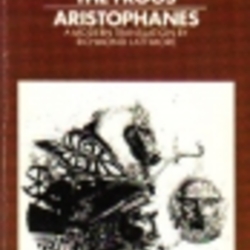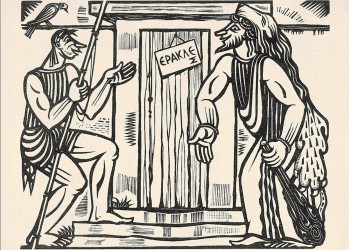
The Frogs is the account - often ribald - of the god's adventures and misadventures on this infernal errand.' (Quote from inside front dustwrapper blurb). So Dionysus, the god presiding over the theater, resolves to go down into Hades, release Euripides, and bring him back to Athens. With the death of the fashionable dramatists Euripides, the future of Athenian drama seems in danger. ***'Aristophanes' great comedy The Frogs was first produced in 405 B.C., in the twenty-sixth year of the Peloponnesian War, only a few months before the final surrender of Athens to Sparta. Tiny loss and rubbing to corners of dustwrapper. Slight rubbing to tail of spine of dustwrapper. Tiny chip and rubbing to head of spine of dustwrapper. A few tiny closed tears and creasing to edges of dustwrapper. Edges of dustwrapper slightly creased, browned and rubbed. In a very good colour-illustrated dustwrapper that has not been price-clipped, showing original publisher's price of 15s net. Very small owner's name to top edge of front paste-down. Tiny unobtrusive white paint splash marks to bottom edge of boards. ***Near fine red cloth-covered boards with gilt titles to spine. New English version verse translation from the Green by Dudley Fitts.

Nil, o nil reliquum… twitter.First impression of the true first edition. Nothing remains impenetrable to these arrows” “Nothing, o, nothing you wretched little lovers, Lil dude trying to steal my hair 3 hours ago “There are those who get gassy when they have sex, like Damnagoras did.

“I guess I’ve talked about milk and wine for a little longer than is strictly needed.” “O, my soul, you should learn to fear your funeral,Īnd not to go on seeking over and over for your destruction, yo… /i/web/status/1… 14 minutes ago

Brandeis University Classics Department.The Sportula: Microgrants for Classics Students.Multiculturalism, Race and Ethnicity in Classics Consortium (MRECC).EOS Africana Receptions of Ancient Greece and Rome.

For the call brekekkex koax koax, see Dover 1993: 219 who draws on Campbell 1984 in proposing that the frog species in question in the Marsh Frog, Rana ridibunda. There may be a hint to the etymology of the frog cry in the Batrakhomuomakhia’s later name-epithet Βρεκαίκιγα ἐσθλὸν (“noble Water-leaper”) The novel compound here may be an echo of Aristophanes’ frog call ( brekekkex koax koax Βρεκεκεκεξ κοαξ κοαξ from the Frogs) or it may be a compound of the root βρέχω (“to moisten, or to be wet”) and ἀίσσω (“to leap”) giving a meaning something like “Water-Darter”. Is it likely that frog-noise was a common complaint in Classical Athens? Similarly, in Aristophanes’ Frogs, the eponymous chorus is depicted as “croaking” both during the chorus and the stichomythic exchange. In the Homeric Batrakhomuomakhia, Athena complains that Athenian Frogs annoy her with their sound and keep her from sleeping. “Brekekeks koaks koaks: a repeated line in Aristophanes’ Frogs, an imitation of frog voices.


 0 kommentar(er)
0 kommentar(er)
